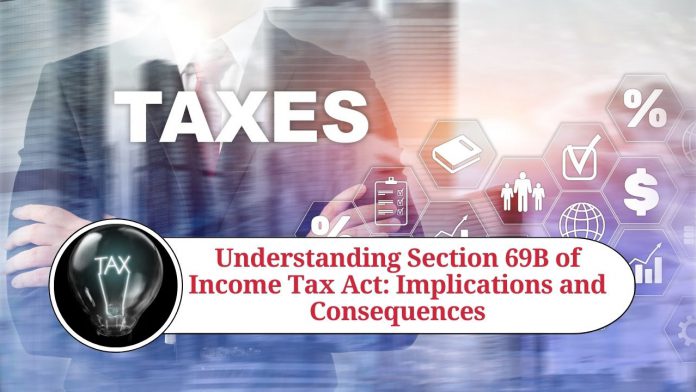The Income Tax Act of India has various provisions aimed at regulating and ensuring that taxpayers pay their fair share of taxes. One such provision is Section 69B of the Income Tax Act, which deals with the unexplained expenditure of a taxpayer. The section is important to understand as it has serious implications and consequences for taxpayers who fail to comply with its provisions. In this blog, we will discuss the meaning of Section 69B of the Income Tax Act, its implications, and the consequences of non-compliance.
Meaning of Section 69B of the Income Tax Act
Section 69B of the Income Tax Act, 1961, deals with the unexplained expenditure of a taxpayer. It states that if a taxpayer incurs any expenditure and the expenditure cannot be satisfactorily explained, then such an expenditure will be deemed as the taxpayer’s income for that particular financial year. The section applies to all taxpayers, including individuals, Hindu Undivided Families (HUFs), firms, companies, and other entities.
Implications of Section 69B of the Income Tax Act
The implications of Section 69B of the Income Tax Act are significant. If a taxpayer is unable to satisfactorily explain any expenditure, then the expenditure will be treated as income. This means that the taxpayer will have to pay tax on the unexplained expenditure, along with interest and penalties. In addition, the taxpayer may also face prosecution under the Income Tax Act.
It is important to note that the burden of proof lies with the taxpayer. The taxpayer must provide satisfactory explanations for the expenditure, failing which the expenditure will be deemed as income. The explanations provided by the taxpayer must be supported by documentary evidence, such as bills, receipts, and vouchers.
Consequences of Non-Compliance
The consequences of non-compliance with Section 69B of the Income Tax Act are severe. If a taxpayer is unable to satisfactorily explain any expenditure, then the expenditure will be treated as income, and the taxpayer will be liable to pay tax on the same. In addition, the taxpayer will also be liable to pay interest on the tax amount and penalties under Section 271(1)(c) of the Income Tax Act.
If the unexplained expenditure is substantial, the taxpayer may also face prosecution under Section 276C of the Income Tax Act, which provides for imprisonment for a term of up to 7 years along with a fine. The prosecution may be initiated by the Income Tax Department, and the burden of proof lies with the taxpayer to establish that the expenditure was not income.
Conclusion
Section 69B of the Income Tax Act is an important provision aimed at regulating and ensuring that taxpayers pay their fair share of taxes. It applies to all taxpayers and deals with unexplained expenditure. The provision has significant implications and consequences for non-compliance, including tax liability, interest, penalties, and even imprisonment. Therefore, it is important for taxpayers to maintain proper records and provide satisfactory explanations for any expenditure to avoid any adverse consequences under the Income Tax Act.
Read more useful content:
- section 234e of income tax act
- section 286 of income tax act
- section 90a of income tax act
- section 40a(7) of income tax act
- section 226(3) of income tax act
- section 24 of income tax act
Frequently Asked Questions (FAQs)
Q1. What is Section 69B of the Income Tax Act?
A1. Section 69B of the Income Tax Act, 1961, deals with the unexplained expenditure of a taxpayer. It states that if a taxpayer incurs any expenditure and the expenditure cannot be satisfactorily explained, then such an expenditure will be deemed as the taxpayer’s income for that particular financial year.
Q2. Who is liable to comply with Section 69B of the Income Tax Act?
A2. Section 69B of the Income Tax Act applies to all taxpayers, including individuals, Hindu Undivided Families (HUFs), firms, companies, and other entities.
Q3. What is the burden of proof under Section 69B of the Income Tax Act?
A3. The burden of proof lies with the taxpayer to provide satisfactory explanations for the expenditure. The explanations must be supported by documentary evidence, such as bills, receipts, and vouchers.
Q4. What are the implications of non-compliance with Section 69B of the Income Tax Act?
A4. Non-compliance with Section 69B of the Income Tax Act has significant implications, including tax liability, interest, penalties, and even imprisonment. The taxpayer may also face prosecution under the Income Tax Act.
Q5. What is the penalty for non-compliance with Section 69B of the Income Tax Act?
A5. The penalty for non-compliance with Section 69B of the Income Tax Act includes tax liability, interest, and penalties under Section 271(1)(c) of the Income Tax Act. If the unexplained expenditure is substantial, the taxpayer may also face prosecution under Section 276C of the Income Tax Act, which provides for imprisonment for a term of up to 7 years along with a fine.
Q6. What should taxpayers do to comply with Section 69B of the Income Tax Act?
A6. Taxpayers should maintain proper records and provide satisfactory explanations for any expenditure. The explanations must be supported by documentary evidence, such as bills, receipts, and vouchers.
Q7. Is it possible to challenge an assessment made under Section 69B of the Income Tax Act?
A7. Yes, it is possible to challenge an assessment made under Section 69B of the Income Tax Act. The taxpayer can file an appeal before the Commissioner (Appeals) and, if necessary, before the Income Tax Appellate Tribunal (ITAT) and higher courts.




















